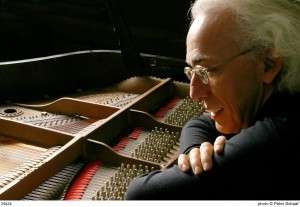|
Back
A fine sampling of German Romanticism Toronto
Koerner Hall
11/25/2015 -
Franz Schubert: Gebet, D. 815 (&) – Ständchen, D. 920 (&) – Der Tanz, D. 826 (* &) – Des Tages Weihe, D. 763 (* &) – Lebenslust, D. 609 (* &) – Der 23. Psalm, D. 706 (* &) – Cantate zur Feier der Genesung der Irene Kiesewetter, D. 936 (# &) – Six Moments Musicaux, D. 780 No. 1, No. 2 & No. 6 (#)
Franz Liszt: Tre Sonetti di Petarca, S. 270 (#)
Johannes Brahms: Zigeunerlieder, Op. 103 (&)
Felix Mendelssohn: Der 43. Psalm, Op. 78 No. 2
Lesley Bouza (soprano), Christina Stelmacovich (alto), Andrew Walker (tenor), Jordan Scholl (bass)
André Laplante (#), James Bourne (&) (piano)
The Toronto Mendelssohn Choir, Noel Edison (conductor), Jennifer Min-Young Lee (*) (associate conductor)

A. Laplante (© Peter Schaff)
This program by the Toronto Mendelssohn Choir was doubly unusual in that it presented a number of short choral works that rarely get the “big choir” treatment, plus the evening’s guest soloist was a pianist, in this case André Laplante, whose deeply thoughtful performance of six pieces helped fullfil the evening’s title German Romantics.
The Mendelssohn Choir with its 130 members is big for a hall (1100 seats) with Koerner’s intimate acoustics. However, Noel Edison has the measure of the space and deploys his full choir and it’s half-size version (the Mendelssohn Singers) to good effect.
The program opened with Schubert’s Gebet (“Prayer”), a wonderful showcase for the choir in that it features its various sections with intertwining musical lines. The four soloists, led off by soprano Lesley Bouza, are each briefly highlighted as well. This was followed by Schubert’s dreamlike Ständchen (“Serenade”) which sets off the alto against the choir’s men. Christina Stelmacovich has a voice much like a boy alto which left a rather chaste impression.
André Laplante then played Liszt’s Three Sonnets of Petrarch with a bold, full tone that still managed to be intimately conversational. Each piece has sections that build and then melt away. I was apprehensive that the choral audience might be rather cool toward a non-vocal interloper, but they were warmly appreciative.
The choir’s current associate conductor, Jennifer Min-Young Lee, assumed the podium for three Schubert works, the playful Der Tanz and Lebenslust bookending the more heartfelt expression of thanks, Des Tages Weihe, in which the men begin, joined by the women, then the women lead off joined by the men. All three pieces were extremely nicely done.
The longest work of the evening was Brahms’ Zigeunerlieder. Tenor Andrew Walker led off many of the ten songs and he was more dutiful than impassioned. The Mendelssohn Singers gave us some lively moments and some soulful ones, but overall the piece could have used more light and shade. Ms Lee then led the women a very fine performance of Schubert’s 23rd Psalm.
Mr. Laplante returned to play three of Schubert’s Moments Musicaux, very subtle, non-showy works. The first one (Moderato) was given a very light touch with a hint of melancholy. Number two (Andantino) rises gently to a fine moment of grandeur. Number six, marked Allegretto (it is normally played very slowly for something so indicated) was given a measured, stately performance not without the Schubertian thoughtfulness.
We then heard Felix Mendelssohn’s treatment of Psalm 43 for unaccompanied choir. In this one the men begin then hold a note as the women join in. Very lovely.
André Laplante then joined the choir’s accompanist, James Bourne, for Schubert’s lively Cantate zur Feier der Genesung der Irene Kiesewetter, a lighthearted thanks for the recovery from illness of a daughter of one of his supporters. It is set to a text in Italian and the second stanza accelerates excitingly - a terrific finale to the concert.
There was an encore: another a capella piece, Brahms’ atmospheric In stiller Nacht.
Michael Johnson
|